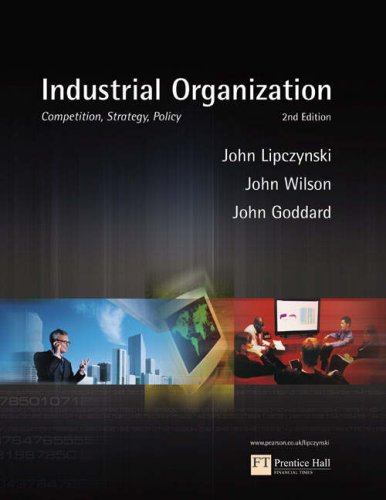

Most ebook files are in PDF format, so you can easily read them using various software such as Foxit Reader or directly on the Google Chrome browser.
Some ebook files are released by publishers in other formats such as .awz, .mobi, .epub, .fb2, etc. You may need to install specific software to read these formats on mobile/PC, such as Calibre.
Please read the tutorial at this link: https://ebookbell.com/faq
We offer FREE conversion to the popular formats you request; however, this may take some time. Therefore, right after payment, please email us, and we will try to provide the service as quickly as possible.
For some exceptional file formats or broken links (if any), please refrain from opening any disputes. Instead, email us first, and we will try to assist within a maximum of 6 hours.
EbookBell Team

4.3
78 reviews
ISBN 10: 0273688022
ISBN 13: 9780273688020
Author: Dr John Lipczynski, Prof John Goddard
This new edition of Industrial Organization improves on the success of the first edition, providing a strong link between the theory and analysis of industrial economics and giving real world application of the theory to the business environment. Extensive case studies provide vivid and entertaining descriptions of industrial market structures and business strategies and behaviour.
This book is ideally suited to students on an intermediate or advanced level course in Industrial Organisation or Industrial Economics
Part I: Theoretical Foundations
Introduction
Static and Dynamic Views of Competition
The Structure–Conduct–Performance Paradigm
Strategic Management: A Short Diversion
Discussion Questions
Further Reading
Production, Costs, Demand and Profit Maximization
Production and Costs
Demand, Revenue, Elasticity and Profit Maximization
Summary
Discussion and Computational Questions
Further Reading
The Neoclassical Theory of the Firm
Historical Development
Perfect Competition and Monopoly
Efficiency and Welfare
Monopolistic Competition
Summary and Computational Questions
Critiques of the Neoclassical Theory of the Firm
Managerial Theories
Behavioural Theory
Summary and Further Reading
Theories of the Firm
The Coasian Firm
Transaction Cost Theory
Agency Theory
Property Rights
Resource-Based Theory
Summary and Further Reading
Corporate Governance and Ethics
Agency Problems
Governance Instruments and Codes
Implementation and Evidence
Business Ethics and Corporate Social Responsibility
Summary and Further Reading
Part II: Structural Analysis of Industry
Oligopoly: Non-Collusive Models
Collusion and Cartels
Game Theory
Market and Industry Definition
Determinants of Seller Concentration
Barriers to Entry
Empirical Studies of Structure and Performance
Part III: Analysis of Firm Strategy
Pricing Strategies
Cost-Plus, Discrimination, Peak-Load, Transfer, and Dispersion
Auctions
Formats, Bidding Models, Winner’s Curse, Revenue Equivalence
Product Differentiation
Lancaster, Hotelling, and Salop Models
Advertising
Determinants, Profit Maximization, Barriers, Information, and Evidence
Innovation and Technological Change
R&D, Diffusion, Patents, and Evidence
Mergers and Strategic Alliances
Horizontal and Non-Profit Motives, Waves, Alliances
Vertical Integration and Restraints
Motives, Costs, Market Power, and Agency
Network Industries and Standards
Demand, Equilibrium, Competition, and Compatibility
Diversification and Multinational Enterprises
Motives, Focus, Evidence, and Corporate Strategy
Part IV: Analysis of Public Policy
Competition Policy
Theoretical Framework, Elements, and Implementation
define industrial organisation
australian road transport industrial organisation
industrial organisational psychology
industrial organisational psychology jobs
industrial organisational psychologist
industrial organisational psychology salary
Tags: Dr John Lipczynski, Prof John Goddard, Organisation, Competition